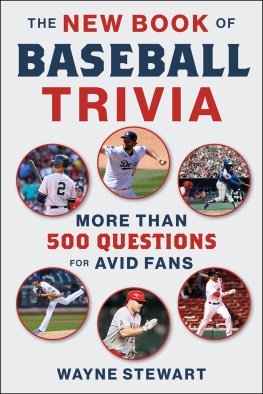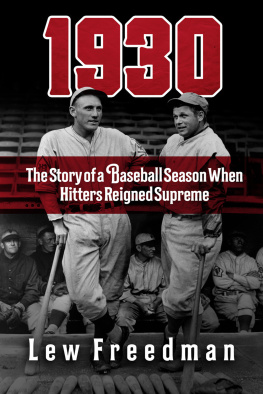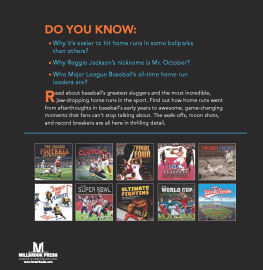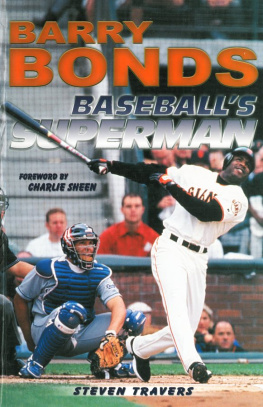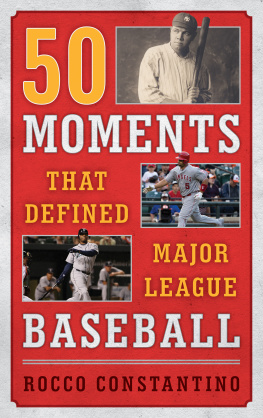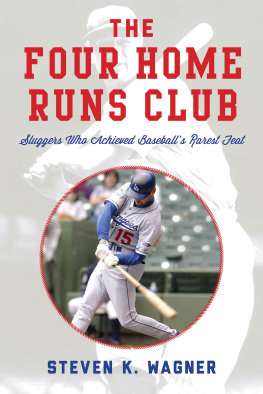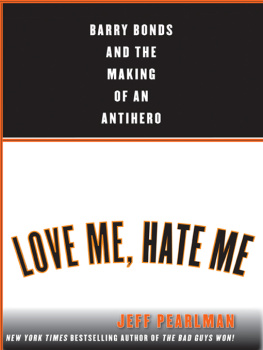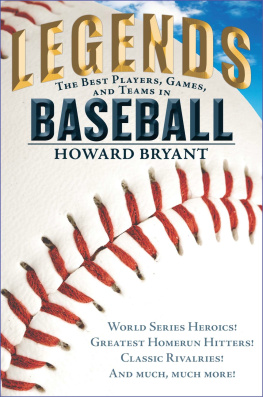GAME OF SHADOWS
Barry Bonds, BALCO,
and the Steroids Scandal That Rocked
Professional Sports
Mark Fainaru-Wada
and
Lance Williams

GOTHAM BOOKS
Published by Penguin Group (USA) Inc.
375 Hudson Street, New York, New York 10014, U.S.A.
Penguin Group (Canada), 90 Eglinton Avenue East, Suite 700, Toronto, Ontario M4P 2Y3, Canada (a division of Pearson Penguin Canada Inc.); Penguin Books Ltd, 80 Strand, London WC2R 0RL, England; Penguin Ireland, 25 St Stephens Green, Dublin 2, Ireland (a division of Penguin Books Ltd); Penguin Group (Australia), 250 Camberwell Road, Camberwell, Victoria 3124, Australia (a division of Pearson Australia Group Pty Ltd); Penguin Books India Pvt Ltd, 11 Community Centre, Panchsheel Park, New Delhi - 110 017, India; Penguin Group (NZ), cnr Airborne and Rosedale Roads, Albany, Auckland 1310, New Zealand (a division of Pearson New Zealand Ltd); Penguin Books (South Africa) (Pty) Ltd, 24 Sturdee Avenue, Rosebank, Johannesburg 2196, South Africa
Penguin Books Ltd, Registered Offices: 80 Strand, London WC2R 0RL, England
Published by Gotham Books, a division of Penguin Group (USA) Inc.
Copyright 2006 by Mark Fainaru-Wada and Lance Williams
All rights reserved
Gotham Books and the skyscraper logo are trademarks of Penguin Group (USA) Inc.
LIBRARY OF CONGRESS CATALOGING-IN-PUBLICATION DATA
Fainaru-Wada, Mark.
Game of Shadows: Barry Bonds, BALCO, and the steroids scandal that rocked professional sports / Mark Fainaru-Wada and Lance Williams.
p. cm.
Includes bibliographical references.
ISBN: 978-1-1012-1676-7
1. Anabolic steroidsHealth aspects. 2. Doping in sports. 3. Steroids. I. Williams,
Lance, 1950 II. Title.
RC1230. F35 2006
362.29dc22 2005037750
Without limiting the rights under copyright reserved above, no part of this publication may be reproduced, stored in or introduced into a retrieval system, or transmitted, in any form, or by any means (electronic, mechanical, photocopying, recording, or otherwise), without the prior written permission of both the copyright owner and the above publisher of this book.
The scanning, uploading, and distribution of this book via the Internet or via any other means without the permission of the publisher is illegal and punishable by law. Please purchase only authorized electronic editions, and do not participate in or encourage electronic piracy of copyrighted materials. Your support of the authors rights is appreciated.
While the author has made every effort to provide accurate telephone numbers and Internet addresses at the time of publication, neither the publisher nor the author assumes any responsibility for errors, or for changes that occur after publication. Further, the publisher does not have any control over and does not assume any responsibility for author or third-party Web sites or their content.
To Max and Ella
MFW
To Barbara
LW
Contents
Cheat or Lose
The Investigation
The Most Wanted Man in America
Bonds and Steroids
Bondss Numbers
Prologue
O n May 22, 1998, the San Francisco Giants arrived in St. Louis for a three-game series with the Cardinals. That weekend, Giants All-Star left fielder Barry Bonds got a firsthand look at the frenzied excitement surrounding Mark McGwire, baseballs emerging Home Run King.
Bonds had recently remarried, but on this trip he was accompanied by his girlfriend, Kimberly Bell, a slender, attractive woman with long brown hair and brown eyes whom he had met four years earlier in the players parking lot at Candlestick Park. Bell had been looking forward to the trip, and it was pleasant in many waysa big hotel room with a view of St. Louiss famous arch; a wonderful seat eight rows behind home plate; and even tornado warnings, which were exotic to a California girl. But Bonds was sulky and brooding. A three-time winner of the National League Most Valuable Player award, he was one of the most prideful stars in baseball. All that weekend, though, he was overshadowed by McGwire.
Even by the standards of the modern game, the Cardinals first baseman was a player of exceptional size and power. That summer the 6-foot-5 McGwire weighed 260 muscular pounds and was hitting balls that traveled in long, soaring arcs. The season was less than two months old, but he already had hit 20 home runs. McGwires pace was ahead of Babe Ruth when he hit 60 home runs in 1927, and also ahead of Roger Maris when he hit 61 to break Ruths record in 1961. Players, fans, and the media were already anticipating that McGwire could break baseballs most storied record, and the noisy attention he received as a result was impossible to ignore.
Before Friday nights game, even the Giants coaches acted like fans, gathering behind the batting cage and watching as McGwire hit 10 batting practice pitches into the stands. During the game itself, McGwire crushed a home run into an area of Busch Stadiums upper deck called Big Mac Land. The home run entitled everyone in the sellout crowd of 43,000 to a free hamburger. For the Giants, Bonds went 1 for 4 with a double. The Cardinals won 43.
On Saturday night, McGwire singled in the first inning and scored from second when Bonds made a poor throw on a hit to left field. Then McGwire hit two more home runs, the second one bouncing off the Chevrolet sign on the left-field scoreboard. The Cards won 1110.
On Sunday, Bonds himself hit a dramatic two-run homer, his 11th of the season, to tie the game in the ninth inning. But in the 12th, after the Giants had pulled ahead 64, McGwire hit an equally dramatic shot to tie the game again. It was his fourth home run of the series, and his 24th of the young season. The Giants finally won in 17, but Bondss mood remained irretrievably foul.
On that trip, Bonds began making racial remarks about McGwire to Kimberly Bell. According to Bell, he would repeat them throughout the summer, as McGwire and Sammy Sosa, the buff, fan-friendly Chicago Cubs slugger who also was hitting home runs at an amazing rate, became the talk of the nation.
Theyre just letting him do it because hes a white boy, Bonds said of McGwire and his chase of Mariss record. The pursuit by Sosa, a Latino player from the Dominican Republic, was entertaining but doomed, Bonds declared. As a matter of policy, Theyll never let him win, he said.
As he sometimes did when he was in a particularly bleak mood, Bonds was channeling racial attitudes picked up from his father, the former Giants star Bobby Bonds, and his godfather, the great Willie Mays, both African-American ballplayers who had experienced virulent racism while starting their professional careers in the Jim Crow South. Barry Bonds himself had never seen anything remotely like that: He had grown up in an affluent white suburb on the San Francisco Peninsula, and his best boyhood friend, his first wife, and his present girlfriend all were white. When Bonds railed about McGwire, he didnt articulate who they were, or how the supposed conspiracy to rig the home run record was being carried out. But his brooding anger was real enough, and it continued throughout a year in which he batted .303, hit 37 home runs, made the All-Star team for the eighth time, and was almost completely ignored. For, as the 1998 season unfolded, the attention of all baseball focused on McGwires home run chase and on his gentlemanly rivalry with Sosa. The quest to hit 61 home runs transfixed even casual fans, in the way that a great pennant race used to do in the old days.
Something about McGwires appearancethe red hair and the freckled, craggy face that sometimes burst into a winning smileseemed to invite affectionate hyperbole. The sportswriters who covered him wrote that McGwire had Popeyes forearms and shoulders as broad as Paul Bunyans. The nature of his quest was also expressed in hyperbolic terms: McGwires home run chase was a metaphor for the best in America, a newspaper editor told an Iowa professor who was studying the chase as a cultural phenomenon. It was more significant than the ascent on Mount Everest, as San Francisco Giants marketing man Pat Gallagher proclaimed. And from acting baseball commissioner Bud Selig down to its ordinary fansanybody who cared about the game and worried about its futureall agreed that McGwires pursuit of the home run record was hugely important. It had made watching the sport of baseball enjoyable again, for the first time in quite a while.


